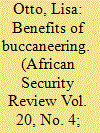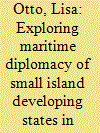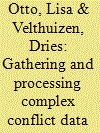|
|
|
Sort Order |
|
|
|
Items / Page
|
|
|
|
|
|
|
| Srl | Item |
| 1 |
ID:
113326


|
|
|
|
|
| Publication |
2012.
|
| Summary/Abstract |
The 17th Conference of the Parties (COP17) had been anticipated as the 'African COP', not only due to the African venue but also due to the opportunity it would afford African countries - with South Africa at the helm - to steer the debate on a global climate change regime. With the conference now over, lobby groups, international organisations, negotiators, observers and commentators alike have been taking stock of its outcome. Despite the litany of developmental and security implications of climate change, COP17 got underway with little hope that much might actually be achieved. In light of the discouraging condition of the global economy, with leading developed economies suffering financially, states were hardly in a mood to be making concessions that would impact their fiscal health. Nonetheless, an agreement was reached. Questions remain, however, about the significance of the outcome of the African COP for the world at large, but ultimately also for Africa.
|
|
|
|
|
|
|
|
|
|
|
|
|
|
|
|
| 2 |
ID:
109928


|
|
|
|
|
| Publication |
2011.
|
| Summary/Abstract |
The modern-day face of what is one of the world's oldest crimes - maritime piracy - is quite different to that of two centuries ago. Over the last decade the hub of global pirate activities has shifted from the East to Africa, with the growing scourge of Somali pirates - armed with automatic weapons and rocket-propelled grenades - having arisen as a global concern as a result of the consequences piracy holds for a litany of security, strategic and economic imperatives. The evolution of Somali piracy off the east coast of Africa has increasingly hinted toward the phenomenon constituting a lucrative industry in the region. Indeed, it is evident that there is a political economy attached to maritime piracy in Somalia and Kenya in particular, which elucidates that piracy is a crime that is based not only at sea, but also on land. By considering the financial system related to piracy, as well as the costs and impacts it holds for locals, there are a number of lessons for counter-piracy efforts, specifically those focusing on Somali piracy. Piracy can, nonetheless, be expected to continue to plague the continent's shores so long as pirates can act with impunity and operate in an environment where the risk is low and the reward high. Until sufficient political will is garnered for the constructive involvement of all stakeholders - the shipping industry included - in a holistic approach to the problem, both on land and at sea, the effects of counter-piracy efforts will be limited.
|
|
|
|
|
|
|
|
|
|
|
|
|
|
|
|
| 3 |
ID:
175495


|
|
|
|
|
| Summary/Abstract |
The study of security issues almost always brings with it a feeling of pessimism, as security practitioners and scholars look through a lens of the world that forms a perspective of threats against the interests of states and the people who live in it. It is easy to forget that Africa is a rich continent with many states showing annual growth despite the impact of the COVID-19 pandemic, another catastrophe the people of Africa are dealing with better than states in the northern hemisphere. However, the international trend, such as the cynical economic self-interest of political rulers who isolate themselves from the citizens of the state, is also a reality in some African states. Flourishing on social divides such as ethnicity, religious difference and outdated ideologies, for a small group of winner-takes-all rulers, it is business-as-usual when they apply financial resources to maintain their armed forces to deal with daily criminality, violent protests and political resistance. The result is that securing the livelihoods and general well-being of increasingly disgruntled citizens (a state responsibility) is compromised. Thus, the insecure conditions created by the broken relationships between the people and those who govern them pose a challenge to the security of nation states in Africa. Furthermore, the populist reaction of citizens against ineffective governance exposes the limitations of global security management systems, such as that of the UN, AU and the peace and security structure of regional communities, in dealing security challenges within states.
|
|
|
|
|
|
|
|
|
|
|
|
|
|
|
|
| 4 |
ID:
185507


|
|
|
|
|
| Summary/Abstract |
As peace and security practitioners and scholars we seldom harness the expectations that a new year will bring a fresh start for people caught up in war, other forms of violent conflict and pressures that cause insecurity and distress. However, we know from past experience that where people feel insecure, a critical mass of people still have the energy to find innovative solutions to improve the well-being of people. Also in Africa, many good people share their knowledge of the many spaces in Africa, in the firm belief that wise leaders and other decision makers would find solutions to problems. In this edition, the authors illustrate in an exceptional way some of the efforts that are already bearing fruit towards security for all who dwell in the continent of Africa.
|
|
|
|
|
|
|
|
|
|
|
|
|
|
|
|
| 5 |
ID:
180620


|
|
|
|
|
| Summary/Abstract |
Currently Africa, together with most other places in the world, is firmly in the grip of an enemy that exposes the weaknesses in human systems and calls for humanity to retreat into ever decreasing spaces. In many cases the best strategic option to deal with the pandemic is to withdraw into a safe space, not only to avoid this enemy but also to gain perspective on how to cope with the consequences, how to recover when infected and how to become resilient while ‘riding the wave’. However, this is easier said than done – especially for people whose well-being and safety are threatened by physical violence or government systems that cannot cope with the complexities of challenges and threats. In this edition, Obasi and colleagues from Nsukka University in Enugu State, Nigeria present a fine example of how people in challenging conditions can succeed in supporting victims of violent conflict to empower themselves in their own limited spaces. Using community theatre as a medium for communication, people can learn new skills to produce arts and crafts as well as developing human capacity and resilience to cope with the dynamics and consequences of violent conflict.
|
|
|
|
|
|
|
|
|
|
|
|
|
|
|
|
| 6 |
ID:
188396


|
|
|
|
|
| Summary/Abstract |
Maritime diplomacy remains a poorly defined concept despite the fact that the maritime domain carries implications for the ways in which states relate to one another both in the past and in the contemporary era. Nonetheless, for many states, the maritime domain has come to hold increasing importance as it intersects with present environmental, economic, and security concerns. This is particularly true in Africa, where many states see the Blue Economy as their next economic frontier, presenting manifold opportunities for growth, but which are in turn threatened by transnational criminal activity, and, the universal challenge of climate change and environmental degradation. This article details the concept of maritime diplomacy and attempts to provide a typology for a deeper understanding of this form of diplomacy. It then considers the practical application of maritime diplomacy by the small island developing states in Africa, providing Mauritius and the Seychelles case studies.
|
|
|
|
|
|
|
|
|
|
|
|
|
|
|
|
| 7 |
ID:
177861


|
|
|
|
|
| Summary/Abstract |
Gathering data, analysing it using appropriate tools and interpreting the information results to make knowledge-driven decisions is a good practice for most security practitioners and scholars interested in peace and security. However, analysts and knowledge producers are consistently confronted with an overload of data and contending views of the causes, dynamics and consequence of violent conflict. Perspectives differs and is sometimes dominated by political interests as well as cultural, ideological, and religious/spiritual beliefs. The outcome of the contentious debates, while important to create a reliable body of knowledge for decision-making, tends to cause a limited understanding and inaction.
|
|
|
|
|
|
|
|
|
|
|
|
|
|
|
|
| 8 |
ID:
185515


|
|
|
|
|
| Summary/Abstract |
Welcome to this edition of the African Security Review. In this issue, our authors offer a bouquet of contributions that highlight the centrality of human security from several perspectives. The real and potential harm of historical religions and ideologies that intentionally seek to harm other people, both physically and mentally, requires counter-narratives that emphasise the vital importance of human rights and other democratic freedoms. The importance of the projection of soft power in the political economy of what remains a liberal world, without importing or exporting regional geopolitical tensions, is such a counter-narrative to the violent nature of hard-power projection. What emerges from the work of our authors is the requirement for civil oversight, professionalism and protection of citizens in the unfortunate cases where the state decides to execute its mandate to wield the sword.
|
|
|
|
|
|
|
|
|
|
|
|
|
|
|
|
| 9 |
ID:
187336


|
|
|
|
|
| Summary/Abstract |
In this edition our authors remind us that although the scourge of organised crime and political violence remains part of societies in Africa, popular views are not always helpful when it comes to finding solutions for sustainable peace and security. For instance, one popular perception is that illicit and criminal activities are always linked to political opposition and insurgency; another is that immigrants are the cause of violent crime in society. Although we accept the evidence that shows a link between the drivers of insecurity such as crime, political resistance and illegal immigration, research shows that this is not always the case in all spaces. However, what does show a strong correlation is the link between government-driven peace initiatives with local ownership, non-governmental organisations and non-violent political movements that bring agency to the quest for assured, sustainable peace.
|
|
|
|
|
|
|
|
|
|
|
|
|
|
|
|
| 10 |
ID:
182429


|
|
|
|
|
| Summary/Abstract |
In this edition, as in others, we focus on some persisting trends that emphasise the gravity of security challenges in Africa, but also succeed in showcasing the successes of some security mechanisms that are causes of optimism and sources of good practices. The current security situation in Africa continues to be characterised by instability in some spaces with several threats to socio-economic development and the general well-being of people being affected by violent conflict. In all cases, as highlighted in this edition, the transnational nature of conflicts requires a collective response involving states and institutions as stakeholders to find solutions and to act against perpetrators to protect people, infrastructure, and assets.
|
|
|
|
|
|
|
|
|
|
|
|
|
|
|
|
| 11 |
ID:
182424


|
|
|
|
|
| Summary/Abstract |
This final edition of 2021 reminds us that securing the African continent starts with communities, as building blocks or centres of peace and security. Successful regional and national security rest on appropriate conflict resolution in communities as the foundation of national policies and security strategies such as counter-insurgency and appropriate responses to pandemics, shaping the convergence of security outcomes for Africa as a whole.
|
|
|
|
|
|
|
|
|
|
|
|
|
|
|
|
|
|
|
|
|